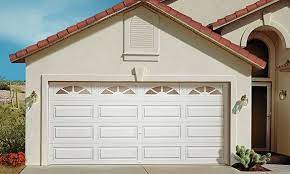Garage Door Repair Keller TX have long served as a crucial component of residential and commercial properties, offering convenience, security, and protection for vehicles and belongings. Traditionally, garage doors have been operated manually, requiring physical effort to open and close them.

However, with advancements in technology, the concept of self-operating garage doors has emerged. This phenomenon refers to garage doors that can open and close autonomously, without any human intervention. In this article, we will delve into the possibilities, mechanisms, and implications of self-operating garage doors.
The Rise of Smart Home Technology:
The advent of smart home technology has paved the way for various automated systems within households, including garage doors. With the integration of sensors, wireless connectivity, and artificial intelligence, it has become possible to automate various functions in our homes. Smart garage door openers have gained popularity, offering enhanced convenience and security features. These systems can be remotely controlled through mobile applications or even programmed to operate automatically based on specific triggers.
Mechanisms and Components:
Self-operating garage doors rely on a combination of hardware and software components to function autonomously. The primary components involved in this system include:
- Sensors: Garage door sensors play a crucial role in detecting obstacles or obstructions in the door’s path. Photoelectric sensors, which emit an infrared beam across the doorway, can sense any disruption and prompt the door to stop or reverse its operation.
- Motorized Mechanism: A motorized mechanism powers the opening and closing of the garage door. Electric motors are commonly used to generate the necessary force to move the door along its tracks.
- Control Systems: The control system, often integrated with smart home technology, governs the overall operation of the garage door. It receives input from sensors, wireless signals, or programmed instructions to determine when to open, close, or stop the door.
Operating Modes:
Self-operating garage doors can be programmed to function in various modes, catering to different user requirements:
- Manual Override: While these doors can operate autonomously, manual override options are essential for emergency situations or when users prefer direct control. This allows individuals to manually open or close the door without disrupting the automated functionality.
- Time-Based Programming: Users can program their garage doors to open and close at specific times of the day. This feature is particularly useful for homeowners who have regular schedules or for commercial properties with predetermined operating hours.
- Sensor-Based Automation: By utilizing sensors, garage doors can automatically detect the presence of a vehicle or individual approaching the entrance. Upon detection, the door can initiate the opening sequence to facilitate seamless entry or exit.
Safety Considerations:
Self-operating garage doors prioritize safety to prevent accidents or damage. Some important safety measures implemented in these systems include:
- Obstacle Detection: Sensors are designed to detect any obstruction in the door’s path, preventing the door from closing and potentially causing harm.
- Force Monitoring: Modern garage door openers are equipped with force monitoring mechanisms. If the door encounters resistance while closing, it will automatically reverse its operation to avoid injury or property damage.
- Security Features: Garage doors can be integrated with security systems, providing additional layers of protection. These may include encrypted wireless communication, password authentication, and remote monitoring capabilities.
Implications and Future Prospects:
The advent of self-operating garage doors has undoubtedly transformed the way we interact with this essential part of our homes. The convenience and time-saving benefits of these systems are clear, offering seamless access to our vehicles and storage spaces. Furthermore, the integration of smart home technology allows for enhanced security features, providing peace of mind for homeowners.
Looking ahead, the future of self-operating garage doors appears promising. Advancements in artificial intelligence and machine learning could lead to more sophisticated automation systems. For instance, predictive algorithms could anticipate user behavior and initiate the opening or closing process accordingly, optimizing convenience. Additionally, increased connectivity with other smart home devices could create an integrated ecosystem, where garage doors seamlessly interact with lighting systems, security cameras, and other appliances.
Conclusion:
The concept of self-operating Garage Door Repair Keller TX represents a significant technological advancement, merging hardware and software components to enhance convenience and security in our daily lives. With the integration of smart home technology, sensors, and control systems, these doors can autonomously open and close, catering to specific user requirements. Safety measures are paramount, ensuring that these systems operate in a secure and user-friendly manner. As technology continues to evolve, we can anticipate further improvements and innovations in self-operating garage doors, offering even greater functionality and integration within the broader context of smart homes.
Keller TX Garage Door
Keller, TX
817-697-2922
